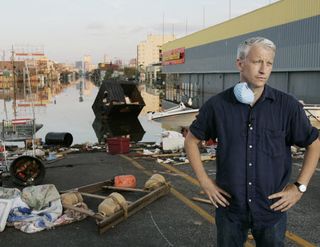10 Years After the Flood: Networks Reflect on Katrina

A downpour of TV content is forecast for this week on the 10th anniversary of Hurricane Katrina and the devastation it unleashed on the Gulf Coast region in general and on New Orleans in particular.
In 2005, cable networks were among the first outlets to show the images of the stunning destruction to property and people’s lives in the days following the storm. Other specials through the years, such as HBO’s Emmy-winning When the Levees Broke: A Requiem in Four Acts, helped chronicle the effects on life on the Gulf Coast in the immediate aftermath of the storm.
This week The Weather Channel is leading the charge with a week of Katrina-themed content, including Katrina 2065, a special that looks at likely scenarios that could take place if Katrina hit 50 years from now. On Friday, Aug. 28, TWC will air a special report, Katrina: 10 Years Later, with Al Roker and Stephanie Abrams.
Also that Friday, TV One will look at the plight of education in New Orleans a decade after Katrina as part of its daily News One Now morning news series hosted by Roland Martin.
BET on Aug. 26 will premiere a news special, Katrina 10 Years Later: Through Hell in High Water, that will chronicle the lives of a diverse group of people who survived Katrina.
On the cable news network front, CNN will debut on Aug. 24 Katrina: The Storm That Never Stopped, in which network anchor Anderson Cooper travels back to the Gulf Coast and looks to reconnect with those residents and people he spoke with a decade ago following the storm.
On the digital front, offerings will include six-part documentary series New Orleans, Here & Now, from Time Inc. and Rampante, debuting Aug. 27 on Time.com and other platforms. It’s about six people living in New Orleans 10 years after Hurricane Katrina and is the first original premium video product from Time. Weather.com on Aug. 25 will stream nine hours of continuous highlights from 2005 Katrina coverage, starting at the same time as the 2005 coverage began and featuring clips from The Weather Channel.
Multichannel Newsletter
The smarter way to stay on top of the multichannel video marketplace. Sign up below.
And in real life (apart from TV), FYI has teamed with the affordable housing non-profit Make It Right to build a solar-powered new tiny home in New Orleans for a middle school teacher. On Aug. 28, they will host a house-warming event at the new 469-square-foot domicile in New Orleans’s Lower Ninth Ward, including Tiny House Nation host John Weisbarth.
— R. Thomas Umstead
Think Tank to FCC: Charter-TWC Deal Should Sail Through
Free-market think tank The Free State Foundation has released a paper outlining the benefits to consumers and broadband of a Charter Communications-Time Warner Cable merger.
Free State senior fellow Seth Cooper said the purpose is not to endorse or oppose the deal, but instead to outline the key considerations the Federal Communications Commission should be, well, considering. But Cooper clearly likes the cut of the deal’s jib and suggests it deserves fairly smooth sailing through the FCC and DOJ deal-vetting process.
He said the potential downsides for consumers appear minimal, and maybe nonexistent, and drew a distinction between this proposed merger and Comcast’s earlier play for TWC, abandoned after the Justice Department and the FCC agreed it should not go through.
Concerns about program withholding or broadband domination don’t apply to a Charter- TWC deal, Cooper said (though he does not concede they should have deep-sixed the earlier deal, either). “Whereas Comcast-TWC would have resulted in a nationwide broadband consumer subscription market share of about 30%, Charter-TWC would result in a nationwide broadband market share of about 21%. And those are numbers for wireline broadband only. The broadband market is much bigger: 43% of all broadband connections are now mobile, with next-generation wireless networks increasingly offering consumers three or more competitive mobile video viewing options.”
In any event, he said, the FCC should not look at “static” indicators like market share or concentration, but instead view the deal in the light of free-market dynamism, a light in which the deal looks good for consumer welfare, he said.
Cooper also called for a swift review, which may already be a bridge too far. The FCC at press time had yet to launch the comment cycle or start the informal shot clock on the deal, as it is still mulling the issue of how to treat third-party access to confidential information submitted by the parties involved.
— John Eggerton
